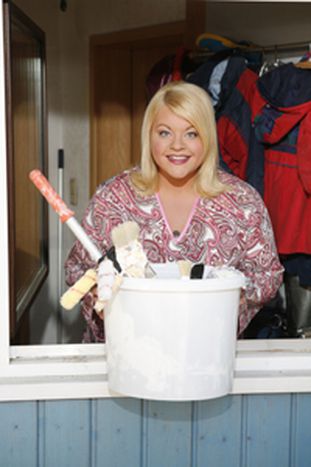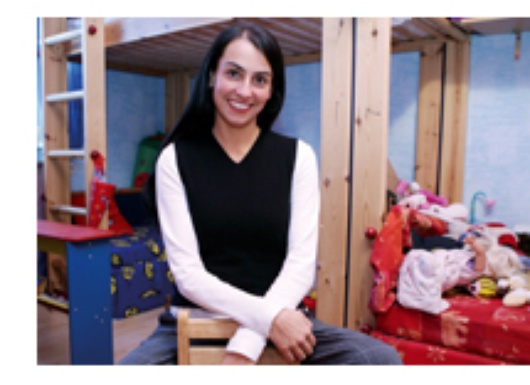
German supernanny: 'emotainment'
Published on
Translation by:
 Sophie Paterson
Sophie Paterson
European audience figures are exploding for so-called 'Emotainment' programmes, devoted to the daily lives of the average person
Fate has not been kind to Conny and her five kids in the past. The family is at breaking point, both financially and emotionally. So presenter Vera Int-Veen (allegedly 'the German counterpart to Rosie O' Donnell') and her 'big-hearted helpers' jet off in their camper van, rally the neighbourhood and offer the family an all-round life-makeover at the end. Tine Wittler, presenter of Einsatz in 4 Wänden (‘Operation Four Walls’), fixes up the abode of a Bavarian family, thereby bringing cosiness to the former residential nightmare. The My Garden team, botanic counterpart to Tine Wittler, transforms west German gardens into oases of well-being.
German television is plagued by a ‘helper syndrome’ that does not shy away from any topic. No emotion that can’t be edited. The wave of the Emotainment format is, however, not limited to Germany, but also floods the TV landscapes of other European countries. In France, Valérie Damidot redecorates the houses of her fellow countrymen and in the UK, the BBC broadcasts Diet Trials.
According to Andrea Nolte of the Institute for Media Studies at Paderborn University, documentaries were previously broadcast to transfer knowledge, whilst the 21st century audience must be content with a light version of the same, which, according to Nolte, follows a 'Before and After' principle. But whatever applies to the soon-to-be-prettified apartments and front gardens, should also go for the preferences of the public: something is allowed if it is popular.
Supernanny - 21st century Mary Poppins?
Tine Wittler, 'Deko-Queen' of German TV (Photo: RTL)
Most widespread is the Supernanny phenomenon, which originated on Britain's Channel 4. Katja Saalfranck undertakes the job of rearing Germany’s children (broadcast on RTL),  such as seven-year-old Shirin, who has been attending school only sporadically and terrorising her mother and siblings for over six months now. In the US 'Supernanny' is Jo Frost on ABC, 'Cathy' on France's M6 and Esther ten Brink (RTL4) in the Netherlands. Swiss station 3+ also auditions families.
such as seven-year-old Shirin, who has been attending school only sporadically and terrorising her mother and siblings for over six months now. In the US 'Supernanny' is Jo Frost on ABC, 'Cathy' on France's M6 and Esther ten Brink (RTL4) in the Netherlands. Swiss station 3+ also auditions families.
It comes in for some particular criticism for working with an actual human subject: a child. A professional educationist helps families whose problems are so huge that they cannot cope with normal family life. This woman lives in the house, analyses their life together and offers solutions in the form of clearly defined rules and structures. It is obvious that problem families, for whom it’s about more than just the usual arguments about cleaning up or homework, are a huge draw for an audience. Consequently, households are shown in which screaming is usually the preferred method of communication. The parents seem just as overstrained as their children. Critics of this intimate view of the daily life of 'underclass' families have coined the expression ‘Voyeur TV’ – the audience gapes, secure in the anonymity of their own four walls.
In his study 'Supernannies and their Public' (2006), Dr. Jürgen Grimm from the Institute of Journalism and Communication Studies at the University of Vienna compares the 'nanny' format of various countries and surveys their audiences. Despite being a cliché, he discovered that on average it is young mothers under thirty who watch the programme in order to gain advice on questions of child-rearing. This has lead to the emergence of a type of open discussion forum for a clientele that views child-rearing advice through official channels with a somewhat critical eye. Grimm formally gets rid of the stereotypical picture of the dim-witted audience. Verdict: positive!
Or just a freak show?
The German Child Protection Agency, however, comes to a different conclusion. In an official statement in 2004 it praised the fact that questions of child-rearing are aired, but indicated that Supernanny’s claim of 'educational work' is ill-deserved. In their view the programme undermines the dignity of the participating child. Once shooting begins, there is no way back. Moreover, they believe that the consequences on the child are not considered, nor what happens when important figures from the immediate vicinity, like perhaps neighbours, acquire such a far-reaching insight into the family’s life. Also, the artificial portrayal was considered unreliable – the impression of successful therapy mainly comes across through clever editing.
This, according to Nolte, is precisely the crux of the programme – the audience primarily wants to be entertained. Therefore the problem families are seen as curiosities: their lives a type of televisual freak show. Nolte points to the narrow schedule of the nanny. One can only offer 'standard educational tips' within this time-frame, he says. American-British nanny Jo Frost has also had to put up with this reproach, among others.
What is the result of this tangled mass of self-help programmes? At best, the unsettling feeling that it is better not to know how your neighbours are getting on. Yet overall, the reality concept 'education on the screen' appears, in conclusion, comparatively harmless.
In-text photo: German supernanny (RTL)
Translated from Erziehung per Knopfdruck


